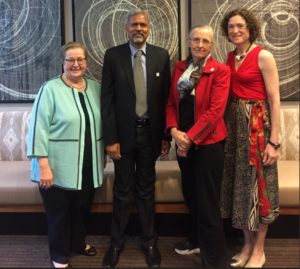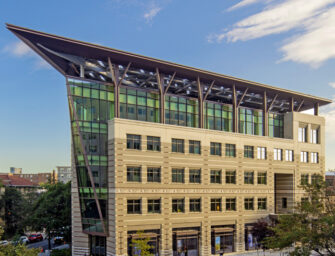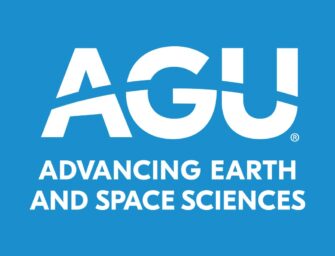Convergence: A Call for More Robust Global Science Collaboration

(L to R) AGU Exec. Vice President Janice LaChance, Head of the Indian Ministry of Earth Sciences Brijesh K Bansal, AGU President Robin Bell, and AGU CEO/ Exec. Director Chris McEntee at the IUGG general assembly in Montreal.
At AGU, we often say that science has no borders and takes no political sides. Science has the powerful ability to make profound impacts on nations, economies, and local communities. However, a tide of nationalism across the globe — manifested in the form of incendiary social media posts, trade wars, reactionary protectionism, and even overt violence — is on the rise. And often hand-in-hand with nationalism comes scientific disinformation campaigns that are both subtle and staggeringly overt. It is in this political environment, when things appear most toxic, that I have been inspired to witness the deep commitment to the scientific enterprise by people from all over the world.
Over the last few months, I have met with leaders from international bodies including the Intergovernmental Oceanographic Commission, the International Union of Geodesy and Geophysics, as well as leading scientists and government officials in India, China, Japan, Europe, and South America – all of whom expressed concern about geopolitical conditions that are sewing fear and undermining science. Despite the threats, the lies, and smears, these men and women stated their commitment to continue to share data, collaborate openly, and research fearlessly because our ecosystem is a fragile one that is under profound stress. These men and women voiced their dedication to work with their peer scientists to employ new tools and methods to improve the prediction and response to natural hazards and increase human understanding of the Earth’s oceans, ecosystems, and space.
I spoke with many scientists who reaffirmed their commitment to diversity, inclusion, scientific integrity, and voiced their support for the next generation of scientists. And this brings me to the opening of abstract submissions for AGU’s 2019 Centennial meeting – and a unique opportunity to support students.
Submissions are now open to all. We encourage you to submit your abstract and join with your colleagues at the world’s largest annual gathering of Earth and space scientists at Fall Meeting 2019 – where ideas are shared, professional relationships are forged, scientific disciplines converge, and where we bring together the people, the imagination, and the science that will ignite our next hundred years to make our planet safer, cleaner, and more sustainable.
In this Centennial year, scientist and AGU Development Board member Jamie Austin has issued a challenge to the AGU membership and Earth and space science community. He will generously match all donations to the Austin Endowment for Student Travel up to the amount of $1 million. With your support, we have the opportunity to create an endowment of $2 million to support students attending AGU Fall Meetings. Meeting this challenge is an opportunity and we need your help.
We are also working hard to educate policy makers and embassy officials about issues some meeting attendees encounter including prolonged visa process times and profiling based on national origin, religion, or other factors. If you encounter a problem like this that hinders your ability to attend Fall Meeting, please share it with us (via [email protected]) as the more data we have, the better equipped we are to address ongoing and future issues. Again this year, AGU GO will be available to those unable to attend in-person.
Today, we stand at the intersection of history and our future. All of us – particularly the scientific community – must join together to address issues that threaten science. We must raise our voices. We must take action. And we must continue to do research with the integrity and transparency that is the hallmark of scientific discovery. Throughout this journey, AGU will be there with you. I hope to see you at Fall Meeting 2019.




There are no comments
Add yours